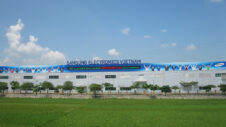Samsung is facing intense competition in the semiconductor market, largely due to TSMC's increasing competitiveness as well as Intel's comeback. The supply glut in the memory market and resulting price declines have already been quite painful for the company.
It didn't help that Samsung Chairman Lee Jae-yong's absence due to his legal troubles prevented Samsung from making major investment decisions. Meanwhile, both TSMC and Intel ramped up their investments and production capacities to turn up the heat on Samsung.
Samsung facing significant challenges in the foundry market
Samsung has a stated goal of becoming the world's largest producer of memory chips and semiconductors by 2030 but it's having to put up with fierce competition from rivals, including the likes of Japan-based Rapidus, that's aided by government support.
TSMC overtook Samsung last year to become the world's top semiconductor maker by sales, bringing in $69.3 billion compared to Intel's 54.23 billion and Samsung's $50.99 billion. TSMC's expertise in ultra-fine chip fabrication, higher yields, and lead in the 3nm and 2nm processes have given it a 57.9% share of the contract chip manufacturing market, compared to Samsung's 12.4%.
Samsung can't get its market share up unless it wins major customers like NVIDIA, Qualcomm, and AMD but TSMC has a far closer relationship with them due to its consistent competitiveness. Samsung needs to up its game if it wants to steal those clients away from TSMC and increase its market share.
Intel is also aggressively spending money, and receiving government support, for its re-entry in the contract chip manufacturing segment. It's building new plants in multiple locations in the US and even considering plants in Germany and Japan. Intel's goal is to overtake both Samsung and TSMC by 2025.
With Chairman Lee finally free of his legal troubles and expected to tighten management of Samsung's growth businesses, it remains to be seen what steps Samsung will now take to improve its position in the lucrative foundry business. The clock's ticking because its rivals are clearly in no mood to take things slow.





